SQA strike ballotpublished at 14:18 BST 1 May 2019
Labour MSP Daniel Johnson asks for the government's response to the announcement that SQA staff are to be balloted for industrial action.
MSPs vote to recognise "serious concerns" about "fundamental failings with regard to subject choice" in schools - and call for "urgent action" to fix this
The Scottish government amendment in the subject choice debate was voted down
Earlier parent groups discuss the reduction in the number of subject choices with the education committee
Craig Hutchison and Louise Wilson
Labour MSP Daniel Johnson asks for the government's response to the announcement that SQA staff are to be balloted for industrial action.
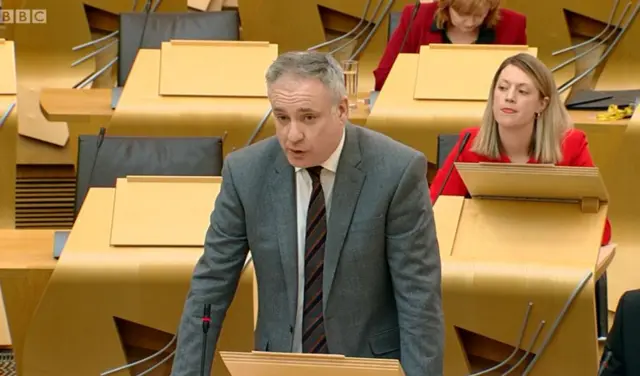 Image source, bbc
Image source, bbcHigher Education Minister Richard Lochhead
Higher Education Minister Richard Lochhead warns the UK government's "chaotic handling of Brexit" does indeed threaten Scotland's research capabilities in higher education.
Mr Lochhead warns of an estimated loss of £37m depending on the Brexit date.
He goes on to point out the University of the Highlands and Islands would not exist if it was not for EU funding and warns of the devastating impact that Brexit would have on UHI.
"Of course the solution is not to leave the EU in the first place."
 Image source, Getty Images
Image source, Getty ImagesThe Scottish Funding Council report looked at the possible impact of Brexit on students, staff and research
Academics and researchers from the EU may be leaving their jobs because of Brexit, according to the Scottish Funding Council (SFC).
The body, which helps fund colleges and universities, says there is "anecdotal evidence" EU staff are finding or considering new roles.
More than a fifth of teaching and research staff are EU nationals.
The SFC also said any fall in the number of EU students could lead to changes for the courses on offer.
Labour MSP Daivd Stewart asks the Scottish government what assessment it has made of how research capabilities in higher education have been affected by Brexit.
 Image source, Getty Images/PA
Image source, Getty Images/PAEducation ministers will now face a quizzing during portfolio questions.
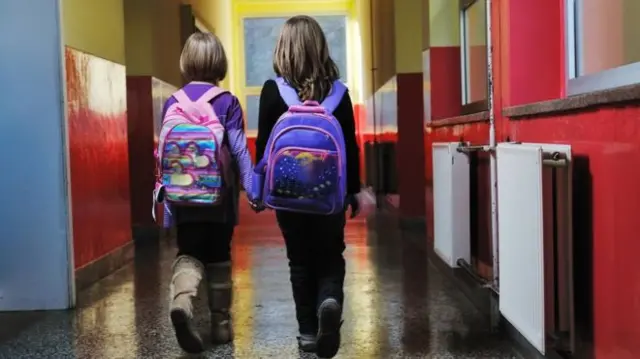 Image source, BENIS ARAPOVIC
Image source, BENIS ARAPOVICMore education is in store for the afternoon, with portfolio questions kicking off at 2pm.
There will be a brief respite with health and sport questions, before the Scottish Tories begin a debate on subject choices.
Finally SNP MSP Fulton Macgregor will lead a debate about nursery funding after deferring entry to P1.
SNP MSP Jenny Gilruth asks if there are schools that give free choice rather than columns to choose from.
Ms Murphy replies there are schools that offer free choice but you can't get away from the columns.
Some schools have a wider choice she explains.
The session draws to a close and the convener moves the committee into private.
Jamie McIvor
BBC Scotland education correspondent
 Image source, bbc
Image source, bbcIt is no surprise that different schools use the new qualifications in different ways.
That was an intentional part of the new qualifications system, and individual schools and councils took decisions on what they believed was right for their local circumstances.
The most popular curricular model allows students to obtain up to six qualifications in S4.
However, a significant number of schools offer seven - while smaller numbers offer five, eight or even routinely avoid presenting candidates for qualifications in S4.
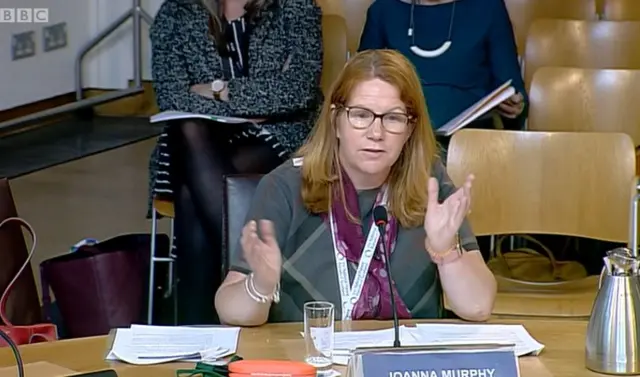
Ms Smith asks about concerns that CfE has moved too far from the core curriculum towards skills.
Joanna Murphy says she respects this view but as an employer, one would want young people to have the appropriate skills.
"School is more than just learning facts."
Part of school must be about looking after young people and not just forcing them to do certain subjects, she adds.
Ms Smith agrees with Joanna Murphy about the benefits of taking a Higher over two years.
The Tory MSP asks if there would be a benefit in bypassing National 5s as universities still value the ability of a pupil to take five Highers in one sitting.
Ms Murphy says that would be beneficial and reiterates her call for pupils to be able to do the Higher over two years.
"They've been talking about the two year Higher since I was at school and it's still not a reality."
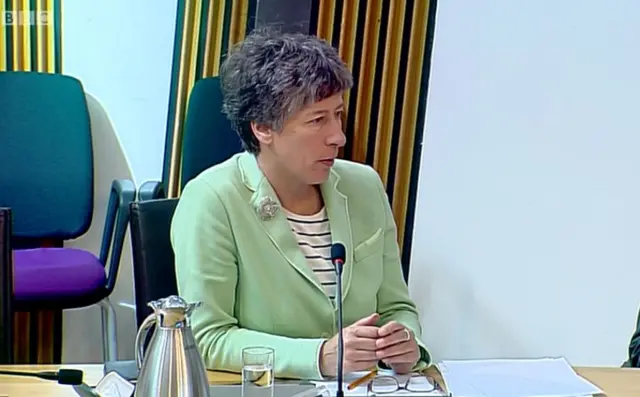
Tory MSP Liz Smith turns discussion to multi-level teaching, where students are taught in the same class for two different qualification levels.
Eileen Prior of Connect says feedback from young people seems to suggest they actually enjoy such teaching because it can challenge them.
It can also be the only option for some rural schools, she adds.
She accepts it might not be what teachers prefer but we should be focusing on what is right for young people.
SNP MSP Alasdair Allan says more people are coming out of school with more Highers.
Mr Allan asks how early children are choosing which Highers they will do in fifth year.
Ms Murphy replies: "Across the board parents are not involved enough in subject choices."
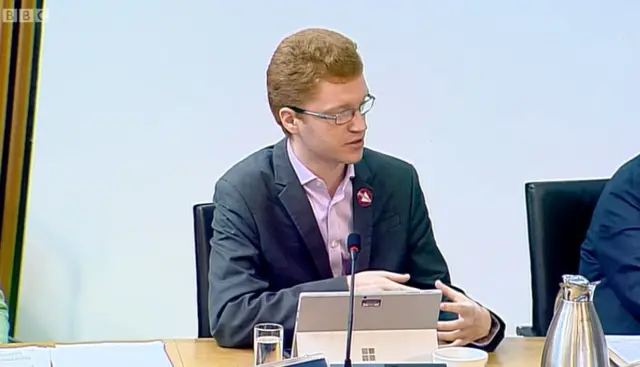
Green MSP Ross Greer asks if schools from more deprived areas are restricting their pupils more in terms of choices.
Eileen Prior says the information she has does not say either way, but intuitively that seems likely.
Mr Greer wonders if there is a role for Education Scotland in getting an overview of the situation.
Absolutely, replies Ms Prior, adding she would expect the body to have a handle on this issue.
Linda O'Neill agrees any new data collection on this would be positive.
Ms O'Neill says the educational outcome statistics show regional variations in attendance and attainment.
The CELCIS representative points out: "So many schools are doing really good innovative things for young people."
Children in foster care have a higher attendance than the general population and leave with more qualifications, explains Ms O'Neill.
However areas that are struggling should be looked at in terms of support, she adds.
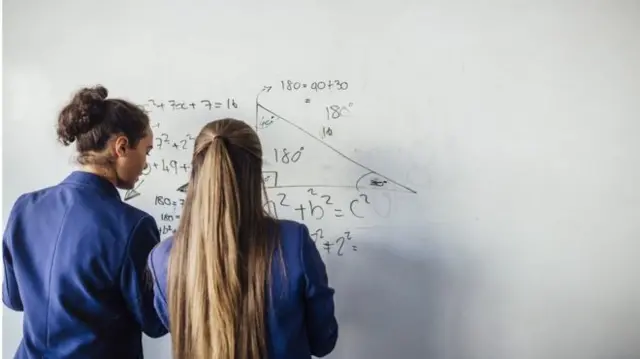 Image source, Getty Images
Image source, Getty ImagesReform Scotland research shows only a minority of state schools now allow pupils to sit more than six exams
State schools in Scotland are cutting the number of exams pupils are allowed to sit, according to new research.
Reform Scotland says the number of National 4 and 5 courses which schoolchildren can take has reduced in recent years.
The situation has been described as the "unintended consequence" of Curriculum for Excellence (CfE) by critics.
The Scottish government insisted it is the qualifications which pupils leave school with that matter the most.
SNP MSP Rona Mackay asks if schools are doing enough to accommodate the needs of looked after children.
The situation is certainty improving and people are more aware of their needs, Linda O'Neill replies.
But the CELCIS rep adds that looked after children are often a priority among many priorities.
Schools are trying to do their best but it can be difficult to understand what the most effective tools are, she says.
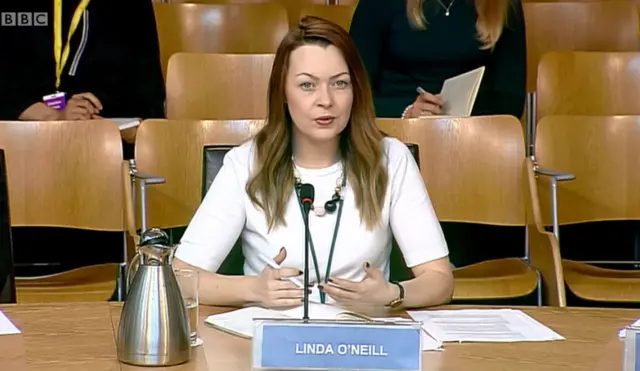 Image source, bbc
Image source, bbcMs O'Neill
Ms Lamont points out the most disadvantaged are doing worse and should the offer to them at fourth year be looked at.
Absolutely, replies Ms O'Neill, highlighting the gap faced by looked after children.
Support must be put in place before children even get to fourth year, she adds.
The CELCIS representative points out that with the trauma many children have been through, extra support will be required.
"Parent and carers must be involved in the most meaningful way possible."
 Image source, Getty Images
Image source, Getty ImagesBack in February we reported this group of MSPs would investigate whether teenagers have a wide enough choice of subjects at school.
This committee is examining what effect the range of subjects on offer has on young people and whether choice has narrowed.
At most schools, students in fourth year get the chance to do six or seven qualifications. Occasionally, they get the chance to do only five.
The committee has sought evidence from parents, teachers and students.
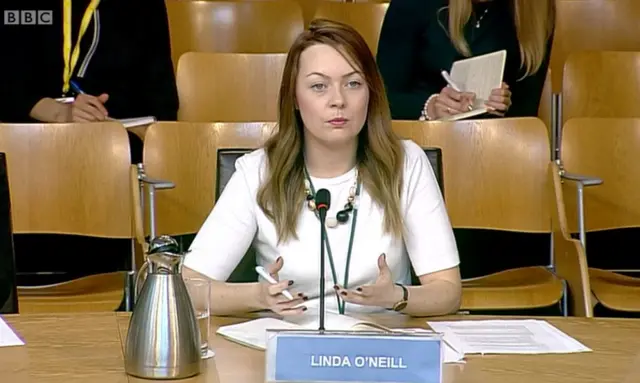
Ms Lamont asks about students fitting into new curricula when moving school.
Linda O'Neill of CELCIS says the educational outcomes for looked after children show the more school placements a young person has, the less likely that will do well.
In an ideal world, school moves would be planned and young people would be consulted she adds.
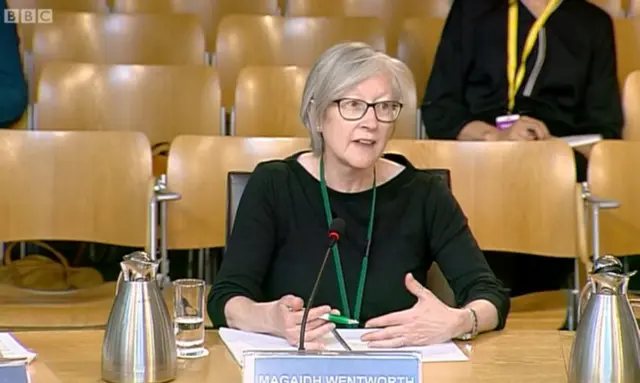
Magaidh Wentworth says there has been slow progress at secondary schools for Gaelic medium education.
Although Gaelic is a national priority, local decision making is often not reflecting that status she adds.